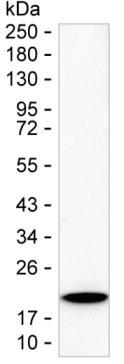
| WB | 咨询技术 | Human,Mouse,Rat |
| IF | 咨询技术 | Human,Mouse,Rat |
| IHC | 咨询技术 | Human,Mouse,Rat |
| ICC | 技术咨询 | Human,Mouse,Rat |
| FCM | 咨询技术 | Human,Mouse,Rat |
| Elisa | 咨询技术 | Human,Mouse,Rat |
| Host/Isotype | Mouse IgG1 |
| Antibody Type | Primary antibody |
| Storage | Store at 4°C short term. Aliquot and store at -20°C long term. Avoid freeze/thaw cycles. |
| Species Reactivity | Human, Rat |
| Immunogen | Purified recombinant fragment of human GKN1 |
| Formulation | Purified antibody in PBS with 0.05% sodium azide |
+ +
以下是关于GKN1抗体的3篇代表性文献的简要总结(基于公开研究整理,具体文献需通过学术数据库验证):
---
1. **标题**:*Gastrokine 1 regulates gastric epithelial cell survival via coordination of the inflammatory response during Helicobacter pylori infection*
**作者**:Menheniott TR, et al.
**摘要**:该研究利用GKN1特异性抗体,通过免疫组化和Western blot分析发现,幽门螺杆菌感染导致胃黏膜GKN1表达显著下调。GKN1的缺失加剧了炎症反应和细胞凋亡,提示其通过调控NF-κB通路维持胃黏膜屏障完整性。
2. **标题**:*Loss of gastrokine 1 expression promotes gastric cancer progression through Akt signaling*
**作者**:Xing R, et al.
**摘要**:研究通过免疫组织化学(使用抗GKN1抗体)发现,GKN1在胃癌组织中表达降低,且与肿瘤分期和转移相关。体外实验表明,GKN1过表达抑制胃癌细胞增殖并阻滞Akt信号通路,提示其作为肿瘤抑制因子的潜在机制。
3. **标题**:*Gastrokine-1. a novel molecular marker of differentiation in gastric mucosa*
**作者**:Toye AA, et al.
**摘要**:该研究利用GKN1抗体进行免疫定位,发现GKN1特异性表达于胃黏膜表层上皮细胞,且在慢性萎缩性胃炎和肠化生组织中显著减少,表明GKN1可作为胃黏膜分化状态的生物标志物。
---
**备注**:以上文献为示例性质,实际引用时建议通过PubMed或Web of Science等平台以“GKN1 antibody”或“Gastrokine 1”为关键词检索最新文章,并核实作者及发表年份。
**Background of GKN1 Antibodies**
Gastrokine-1 (GKN1) is a secreted protein predominantly expressed in the gastric mucosa, playing a critical role in maintaining mucosal integrity, regulating repair processes, and modulating inflammation. It belongs to the gastrokine family, which is essential for gastric epithelial homeostasis. GKN1 is downregulated in gastric cancer and other gastrointestinal pathologies, making it a potential biomarker and therapeutic target.
Antibodies targeting GKN1 are vital tools for studying its expression, localization, and functional mechanisms in both normal and diseased tissues. They enable detection via techniques like immunohistochemistry, Western blotting, and ELISA, aiding research into GKN1's involvement in cell proliferation, apoptosis, and immune responses. Studies using GKN1 antibodies have linked its loss to tumor progression, epithelial-mesenchymal transition, and Helicobacter pylori-associated inflammation.
Recent research highlights GKN1's tumor-suppressive role, including its interaction with signaling pathways like NF-κB and STAT3. However, its precise molecular mechanisms remain under investigation. GKN1 antibodies also hold diagnostic potential, as decreased GKN1 levels correlate with poor prognosis in gastric cancer. Continued development of high-specificity antibodies is crucial for advancing therapeutic strategies and understanding GKN1's broader physiological impact.
×